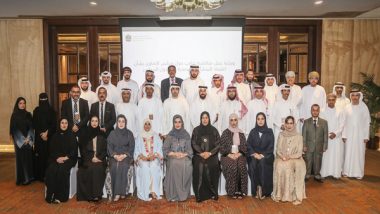Dubai [UAE], November 16 (ANI/WAM): The Ministry of Climate Change and Environment (MOCCAE) hosted a workshop to discuss the experiences of the Gulf Cooperation Council (GCC) countries in accrediting food facilities that export to the member states.
The workshop, which was held in Dubai, reflects the UAE's key role in enhancing sustainable food security at both local and regional levels by fostering exchange of expertise, best practices, and increasing integration among GCC countries.
Additionally, the workshop aligns with the strategic goals of the Ministry of Climate Change and Environment to enhance food security in the UAE.
By showcasing best practices in accrediting food facilities exporting their products to GCC, the workshop emphasised ensuring food safety at the source, while minimising the risk of diseases, pests, and other threats crossing borders through imported food.
The workshop participants included members of the technical teams from the food safety authorities and regulatory bodies responsible for food safety in the GCC countries, along with representatives from relevant agencies and local authorities in the UAE that oversee food safety.
Marwan Abdullah Al Zaabi, Assistant Under-Secretary for the Regions Sector at the Ministry of Climate Change and Environment, welcomed the attendees.
He said that through such workshops the Ministry aims to streamline the mechanism of accrediting food facilities outside the country, following the best local, regional, and international practices. By doing so, the Ministry aims to proactively identify challenges and offer recommendations for improving the proper application of this mechanism. It also seeks to address key challenges related to handling and verifying halal foods at every stage of the food supply chain, from farm to fork.
He stated, "The UAE has made significant progress in accrediting establishments that export food products of animal origin, starting from assessments to evaluate the veterinary health status of exporting countries, through to the alignment of health certification models. These efforts ensure that export protocols comply with the health certification models outlined in the GCC Guide for Control on Imported Foods. Approval is granted to food establishments only after verifying their compliance with food safety and halal standards. His Excellency highlighted that this year, the Ministry of Climate Change and Environment is celebrating the tenth anniversary of its electronic services for accrediting such establishments."
The workshop is part of the recommendations from the 8th meeting of the Ministerial Committee for Food Safety held on 7th March 2024, in Doha. The ministerial meeting emphasised the need for adopting a unified vision for overseeing food exports and including it in the GCC Guide.
This is aimed at enhancing efforts to complete the requirements of the customs union and the economic agreement among the member states, which stipulates unobstructed flow of goods without customs or non-customs barriers. It also seeks mutual recognition of accreditation procedures among the member states.
During the workshop, each country presented their experience regarding the mechanisms for accrediting food facilities abroad through three main topics.
The first topic focused on products of animal origin, while the second one addressed the accreditation mechanism for halal food products. The third and final discussion was centred on the accreditation of conformity assessment bodies, which play a crucial role in verifying compliance with food safety requirements. Attendees from the member states shared their experiences.
At the conclusion of the workshop, a number of speakers and participating teams were honoured for their continued collaboration in enhancing food security in the GCC countries. (ANI/WAM)
(This is an unedited and auto-generated story from Syndicated News feed, LatestLY Staff may not have modified or edited the content body)













 Quickly
Quickly

















